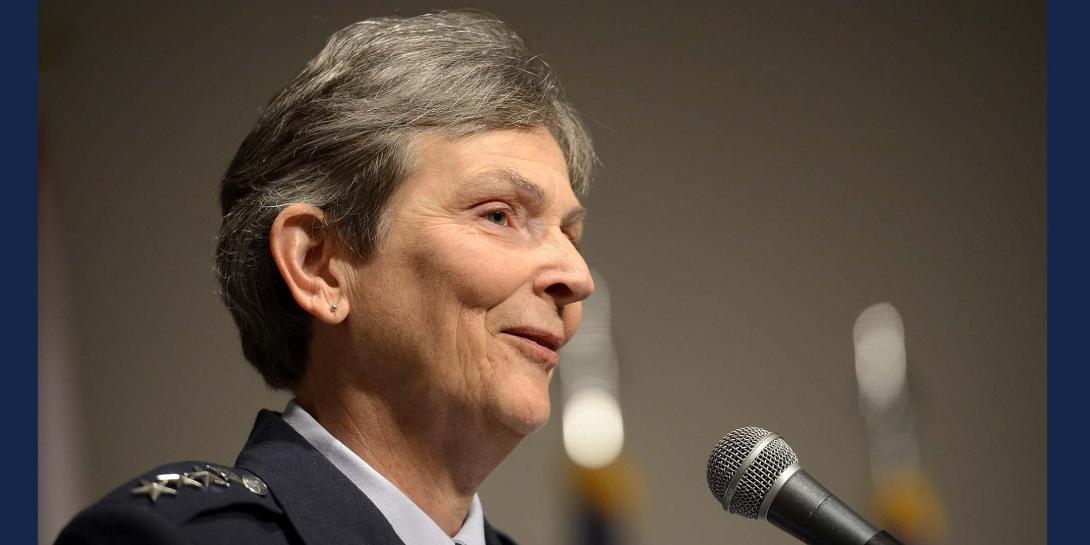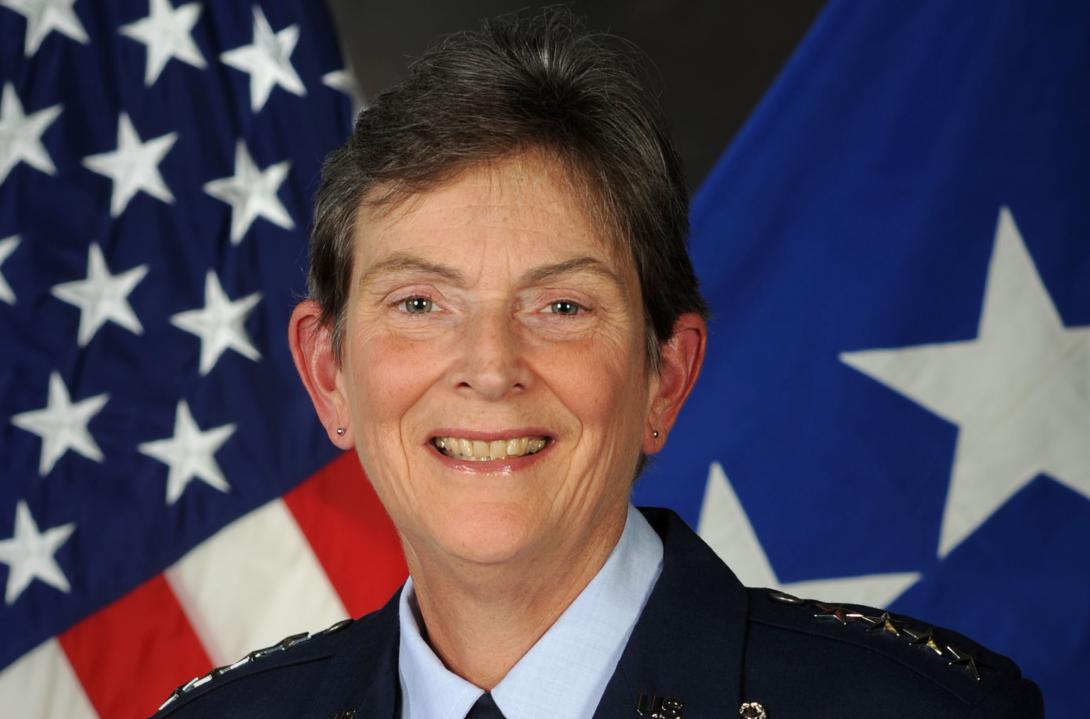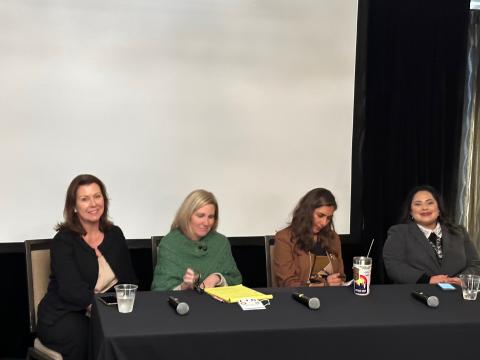Diverse Leadership Can Tackle Biases of Women in STEM
When they are armed with the right education and background and leadership is diverse, women are able to plow through the biases of women in STEM—just like Gen. Ellen M. Pawlikowski, commander of the U.S. Air Force Materiel Command at Wright-Patterson Air Force Base did in the mid 1970s and beyond.
It is said that leaders aren’t born, they’re made—and Gen. Ellen Pawlikowski embodies the notion. Motivated early on by her strong and determined mother, and then tested in her pursuit to prevail at a male-dominated career in a male-dominated world, she inspires today’s young women seeking to become the next generation of scientists, technology experts, engineers and mathematicians. SIGNAL Media and AFCEA International’s Women in AFCEA address the issue in a multi-month project to highlight women in STEM.
Gen. Ellen M. Pawlikowski, USAF, never felt as though she did not belong in the community of scientists, technologists, engineers or mathematicians. Even when, as a freshman at the New Jersey Institute of Technology (NJIT), her physics professor started every class with, “Gentlemen, this is what we will cover today.”
Gen. Pawlikowski always knew a career in STEM was meant for her.
“I love math. I love chemistry. I love science. I love exploring new things and I always viewed laboratories as an opportunity to be an adventurer, so to speak,” says Gen. Pawlikowski, who today commands the U.S. Air Force Materiel Command at Wright-Patterson Air Force Base in Ohio.
She never had trouble finding lab partners; in fact, they lined up to work with her. “I think it was because they saw the intensity that I had in doing the projects and I was a good writer, so I never felt that I could not pursue what I loved when it came to science and engineering,” the general declares.
That feeling of inclusiveness with her classmates is something she strives to deliver now as a leader. “Everywhere I go, I try to provide an environment that nurtures all kinds of diversity. Particularly in science and engineering, the diversity of thought that comes from having people from many different walks of life, from many different backgrounds, is a tremendous multiplier when it comes to problem solving,” Gen. Pawlikowski says.
She finds it interesting to think back on the different obstacles that made things harder for her as a woman pursing a STEM-based career—such as having only one woman’s bathroom—for every two floors—in the chemical engineering building at NJIT.
“When I talk about creating an environment, it’s even a simple thing about making sure there are enough bathroom facilities available for everybody. That’s all part of it,” Gen. Pawlikowski states.
Other hurdles she faced early on were institutional limitations placed on women—sometimes because of their few numbers and sometimes because of the perception that women “didn’t need these jobs.”
One story sticks out. In 1976, as part of her ROTC training, she attended summer camp. A small percentage of candidates who finished, roughly 10 percent, were designated distinguished graduates, an important classification that was permanently noted on military records and helped expand cadets’ career opportunities. When she received final feedback from her instructor, he told her this: “You did well. You did better than I ever thought a woman would—good enough to be a distinguished graduate—but you don’t need it,” she recalls the conversation. “There are a couple of guys who really need it to be competitive in pilot training so I’m giving it to one of them.” At the time, women couldn’t apply for pilot training.
“That hurt,” Gen. Pawlikowski acknowledges. But she wasn’t deterred. “Frankly, what I did when doors were closed … [was] look for doors that were open elsewhere. I couldn’t go into the operational field and to a degree that may have been what led me to the science and engineering career field.”
Eventually, most of these proverbial doors opened, and today all military career fields are open to women—even front-line combat roles.
But implicit bias—the unconscious belief that girls and women are not as good as boys and men in math and science—remains. How can we tackle it?
Gen. Pawlikowski takes a two-fold approach. First she believes “when we arm minorities and women with the right education and the right backgrounds, they go into the field and they don’t recognize these implicit biases. They just plow through them. I kind of like to think that’s what I did.”
Another key component is to have diversity in leadership in order to recognize those biases. “Even though there is one person in charge, it’s really the leadership team that you put around you that can tackle that. Then you can go about working to correct the biases. Diversity at the higher levels, I think, will go a long way in helping us with that,” Gen. Pawlikowski says.
None of this is possible though if women and minorities aren’t exposed to opportunities in math and science from an early age. “There’s a saying that says start behind, stay behind,” Gen. Pawlikowski affirms. She has done her part to make sure young women are exposed to math and science in ways that are less intimidating and has traveled to middle schools and encouraged them to continue taking those classes.
“I take it as a personal obligation to get out there and be a role model,” Gen. Pawlikowski says. “I often have young women come up and tell me how much they have been inspired by just seeing me and having a chance to talk to me. It’s a pretty humbling experience for me because I don’t see myself as that. I just see myself as another engineer trying to get the next problem solved.”
A significant method to incentivize women to stay in STEM-based careers is to provide examples of potential so they don’t view it as something unattainable.
Gen. Pawlikowski cites other women who have “made it” as examples, including Wanda Austin, CEO of The Aerospace Corporation and Gen. Pawlikowski’s predecessor, Janet Wolfenbarger, who was also an engineer.
Gen. Pawlikowski’s inspiration to lead comes from her parents, particularly her mother, who was born with a heart defect and was told she would not live beyond 16 or have any children. She died at 83 of Alzheimer’s after a long life with her husband and four daughters.
“Her view on life was there’s nothing you can’t do,” Gen. Pawlikowski shares. “Never let anyone limit you for what you want to do. That can-do attitude was a lot of what motivated me in everything I did.”
Join AFCEA now, where for $50 a year, you can make a difference in the STEM community, for women, students and for national security. Read about AFCEA’s programs for women in STEM.
Join us for AFCEA's first women's panel. "Why Are Women Leaving STEM?" begins at 1:30 p.m. on August 3 in the Engagement Theater at TechNet Augusta. The conversation continues during a networking reception immediately following the session courtesy of panel sponsors Walker and Associates and Ciena.





Comment
Fun Fact...General
Fun Fact...General Pawlikowski was a Young AFCEAN winner back in her CGO days.
Comments